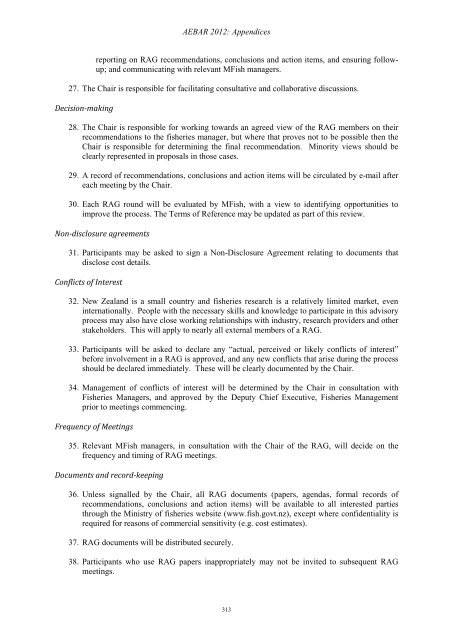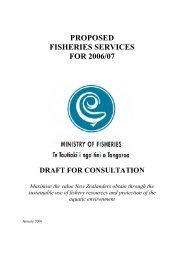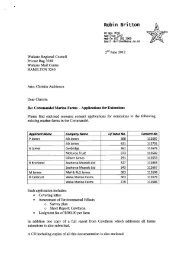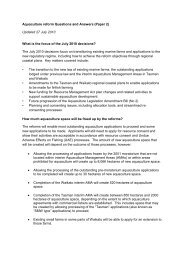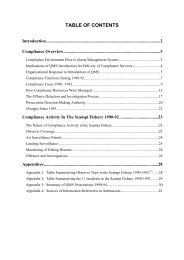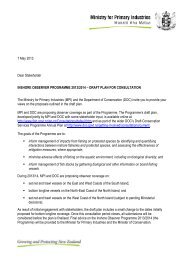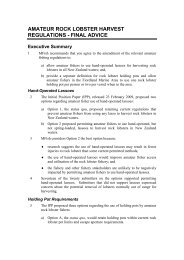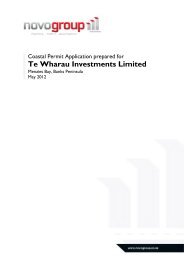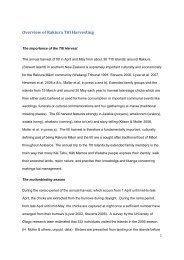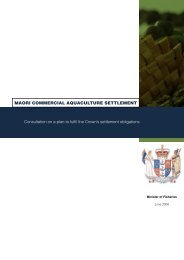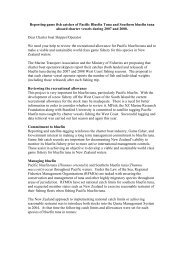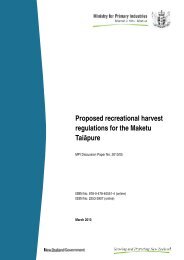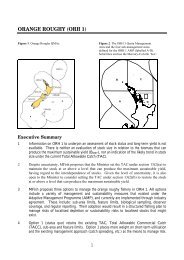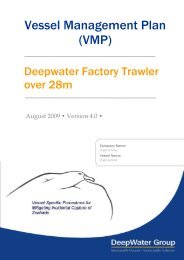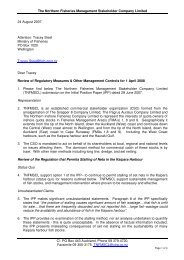- Page 1 and 2:
Aquatic Environment and Biodiversit
- Page 3 and 4:
AEBAR 2012 Acknowledgements In addi
- Page 5 and 6:
AEBAR 2012 Contents PREFACE .......
- Page 7 and 8:
1. INTRODUCTION 1.1. Context and pu
- Page 9 and 10:
AEBAR 2012: Introduction Table 1.2:
- Page 11 and 12:
AEBAR 2012: Introduction • Impact
- Page 13 and 14:
AEBAR 2012: Introduction coastal/co
- Page 15 and 16:
AEBAR 2012: Research themes THEME R
- Page 17 and 18:
AEBAR 2012: Protected species: THEM
- Page 19 and 20:
AE&B Review: Protected species: Sea
- Page 21 and 22:
AE&B Review: Protected species: Sea
- Page 23 and 24:
AE&B Review: Protected species: Sea
- Page 25 and 26:
AE&B Review: Protected species: Sea
- Page 27 and 28:
AE&B Review: Protected species: Sea
- Page 29 and 30:
AE&B Review: Protected species: Sea
- Page 31 and 32:
AEBAR 2012: Protected species: Sea
- Page 33 and 34:
AEBAR 2012: Protected species: Sea
- Page 35 and 36:
AEBAR 2012: Protected species: Sea
- Page 37 and 38:
AEBAR 2012: Protected species: Sea
- Page 39 and 40:
AEBAR 2012: Protected species: Sea
- Page 41 and 42:
AEBAR 2012: Protected species: Sea
- Page 43 and 44:
AEBAR 2012: Protected species: Sea
- Page 45 and 46:
AEBAR 2012: Protected species: Fur
- Page 47 and 48:
4.2.2. Distribution AEBAR 2012: Pro
- Page 49 and 50:
AEBAR 2012: Protected species: Fur
- Page 51 and 52:
AEBAR 2012: Protected species: Fur
- Page 53 and 54:
AEBAR 2012: Protected species: Fur
- Page 55 and 56:
AEBAR 2012: Protected species: Fur
- Page 57 and 58:
a b c d e f AEBAR 2012: Protected s
- Page 59 and 60:
4.4.4. Sources of uncertainty AEBAR
- Page 61 and 62:
4.6. References AEBAR 2012: Protect
- Page 63 and 64:
AEBAR 2012: Protected species: Fur
- Page 65 and 66:
5.1. Context AEBAR 2012: Protected
- Page 67 and 68:
AEBAR 2012: Protected species: Seab
- Page 69 and 70:
5.2. Biology AEBAR 2012: Protected
- Page 71 and 72:
AEBAR 2012: Protected species: Seab
- Page 73 and 74:
AEBAR 2012: Protected species: Seab
- Page 75 and 76:
AEBAR 2012: Protected species: Seab
- Page 77 and 78:
AEBAR 2012: Protected species: Seab
- Page 79 and 80:
AEBAR 2012: Protected species: Seab
- Page 81 and 82:
AEBAR 2012: Protected species: Seab
- Page 83 and 84:
AEBAR 2012: Protected species: Seab
- Page 85 and 86:
AEBAR 2012: Protected species: Seab
- Page 87 and 88:
AEBAR 2012: Protected species: Seab
- Page 89 and 90:
It included two goals that set the
- Page 91 and 92:
AEBAR 2012: Protected species: Seab
- Page 93 and 94:
AEBAR 2012: Non-protected bycatch F
- Page 95 and 96:
AEBAR 2012: Non-protected bycatch T
- Page 97 and 98:
AEBAR 2012: Non-protected bycatch t
- Page 99 and 100:
AEBAR 2012: Non-protected bycatch d
- Page 101 and 102:
AEBAR 2012: Non-protected bycatch F
- Page 103 and 104:
AEBAR 2012: Non-protected bycatch
- Page 105 and 106:
AEBAR 2012: Non-protected bycatch 5
- Page 107 and 108:
AEBAR 2012: Non-protected bycatch 5
- Page 109 and 110:
AEBAR 2012: Non-protected bycatch 5
- Page 111 and 112:
AEBAR 2012: Non-protected bycatch m
- Page 113 and 114:
AEBAR 2012: Non-protected bycatch l
- Page 115 and 116:
Trend in interactions contd. AEBAR
- Page 117 and 118:
AEBAR 2012: Non-protected bycatch B
- Page 119 and 120:
AEBAR 2012: Non-protected bycatch O
- Page 121 and 122:
AEBAR 2012: Non-protected bycatch T
- Page 123 and 124:
AEBAR 2012: Non-protected bycatch S
- Page 125 and 126:
AEBAR 2012: Non-protected bycatch 6
- Page 127 and 128:
AEBAR 2012: Non-protected bycatch F
- Page 129 and 130:
AEBAR 2012: Non-protected bycatch F
- Page 131 and 132:
AEBAR 2012: Non-protected bycatch F
- Page 133 and 134:
AEBAR 2012: Non-protected bycatch F
- Page 135 and 136:
AEBAR 2012: Non-protected bycatch F
- Page 137 and 138:
AEBAR 2012: Non-protected bycatch 6
- Page 139 and 140:
AEBAR 2012: Non-protected bycatch F
- Page 141 and 142:
AEBAR 2012: Non-protected bycatch F
- Page 143 and 144:
AEBAR 2012: Non-protected bycatch 6
- Page 145 and 146:
AEBAR 2012: Non-protected bycatch F
- Page 147 and 148:
AEBAR 2012: Non-protected bycatch F
- Page 149 and 150:
AEBAR 2012: Non-protected bycatch 6
- Page 151 and 152:
AEBAR 2012: Non-protected bycatch F
- Page 153 and 154:
AEBAR 2012: Non-protected bycatch 6
- Page 155 and 156:
AEBAR 2012: Non-protected bycatch 6
- Page 157 and 158:
6.4. Indicators and trends AEBAR 20
- Page 159 and 160:
AEBAR 2012: Non-protected bycatch M
- Page 161 and 162:
AEBAR 2012: Benthic impacts 7. Bent
- Page 163 and 164:
AEBAR 2012: Benthic impacts board a
- Page 165 and 166:
AEBAR 2012: Benthic impacts Figure
- Page 167 and 168:
AEBAR 2012: Benthic impacts Rice (2
- Page 169 and 170:
AEBAR 2012: Benthic impacts megafau
- Page 171 and 172:
AEBAR 2012: Benthic impacts Based p
- Page 173 and 174:
7.3.2. Distribution of Fishing AEBA
- Page 175 and 176:
AEBAR 2012: Benthic impacts Baird e
- Page 177 and 178:
AEBAR 2012: Benthic impacts Figure
- Page 179 and 180:
Area (1000 sq.km) Area (1000 sq.km)
- Page 181 and 182:
AEBAR 2012: Benthic impacts changes
- Page 183 and 184:
7.3.5. Current research AEBAR 2012:
- Page 185 and 186:
7.5. References AEBAR 2012: Benthic
- Page 187 and 188:
AEBAR 2012: Benthic impacts Rowden
- Page 189 and 190:
AEBAR 2012: Ecosystem effects: NZ r
- Page 191 and 192:
AEBAR 2012: Ecosystem effects: NZ r
- Page 193 and 194:
AEBAR 2012: Ecosystem effects: NZ r
- Page 195 and 196:
AEBAR 2012: Ecosystem effects: NZ r
- Page 197 and 198:
AEBAR 2012: Ecosystem effects: NZ r
- Page 199 and 200:
AEBAR 2012: Ecosystem effects: NZ r
- Page 201 and 202:
AEBAR 2012: Ecosystem effects: NZ r
- Page 203 and 204:
AEBAR 2012: Ecosystem effects: NZ r
- Page 205 and 206:
AEBAR 2012: Ecosystem effects: NZ r
- Page 207 and 208:
AEBAR 2012: Ecosystem effects: Habi
- Page 209 and 210:
AEBAR 2012: Ecosystem effects: Habi
- Page 211 and 212:
AEBAR 2012: Ecosystem effects: Habi
- Page 213 and 214:
AEBAR 2012: Ecosystem effects: Habi
- Page 215 and 216:
AEBAR 2012: Ecosystem effects: Habi
- Page 217 and 218:
AEBAR 2012: Ecosystem effects: Land
- Page 219 and 220:
AEBAR 2012: Ecosystem effects: Land
- Page 221 and 222:
AEBAR 2012: Ecosystem effects: Land
- Page 223 and 224:
AEBAR 2012: Ecosystem effects: Land
- Page 225 and 226:
AEBAR 2012: Ecosystem effects: Land
- Page 227 and 228:
AEBAR 2012: Ecosystem effects: Land
- Page 229 and 230:
AEBAR 2012: Marine Biodiversity THE
- Page 231 and 232:
MPI Research (current) NZ Research
- Page 233 and 234:
11.1.2. Defining biodiversity AEBAR
- Page 235 and 236:
AEBAR 2012: Marine Biodiversity Mar
- Page 237 and 238:
AEBAR 2012: Marine Biodiversity New
- Page 239 and 240:
AEBAR 2012: Marine Biodiversity •
- Page 241 and 242:
AEBAR 2012: Marine Biodiversity Fig
- Page 243 and 244:
AEBAR 2012: Marine Biodiversity 11.
- Page 245 and 246:
AEBAR 2012: Marine Biodiversity sta
- Page 247 and 248:
AEBAR 2012: Marine Biodiversity to
- Page 249 and 250:
AEBAR 2012: Marine Biodiversity ACH
- Page 251 and 252:
Progression of research understandi
- Page 253 and 254:
AEBAR 2012: Marine Biodiversity and
- Page 255 and 256:
AEBAR 2012: Marine Biodiversity Sur
- Page 257 and 258:
AEBAR 2012: Marine Biodiversity wor
- Page 259 and 260:
AEBAR 2012: Marine Biodiversity dat
- Page 261 and 262:
AEBAR 2012: Marine Biodiversity Ove
- Page 263 and 264: AEBAR 2012: Marine Biodiversity and
- Page 265 and 266: AEBAR 2012: Marine Biodiversity 11.
- Page 267 and 268: AEBAR 2012: Marine Biodiversity A n
- Page 269 and 270: AEBAR 2012: Marine Biodiversity aci
- Page 271 and 272: AEBAR 2012: Marine Biodiversity Pro
- Page 273 and 274: AEBAR 2012: Marine Biodiversity inv
- Page 275 and 276: AEBAR 2012: Marine Biodiversity Ros
- Page 277 and 278: AEBAR 2012: Marine Biodiversity Spe
- Page 279 and 280: AEBAR 2012: Marine Biodiversity spe
- Page 281 and 282: AEBAR 2012: Marine Biodiversity maj
- Page 283 and 284: AEBAR 2012: Marine Biodiversity mod
- Page 285 and 286: AEBAR 2012: Marine Biodiversity iv)
- Page 287 and 288: 11.5. References AEBAR 2012: Marine
- Page 289 and 290: AEBAR 2012: Marine Biodiversity D
- Page 291 and 292: AEBAR 2012: Marine Biodiversity Lea
- Page 293 and 294: AEBAR 2012: Marine Biodiversity O'D
- Page 295 and 296: AEBAR 2012: Marine Biodiversity Thr
- Page 297 and 298: AEBAR 2012: Marine Biodiversity Tar
- Page 299 and 300: 12. Appendices AEBAR 2012: Appendic
- Page 301 and 302: AEBAR 2012: Appendices 14. To advis
- Page 303 and 304: AEBAR 2012: Appendices different co
- Page 305 and 306: AEBAR 2012: Appendices 12.3. Terms
- Page 307 and 308: AEBAR 2012: Appendices • To devel
- Page 309 and 310: AEBAR 2012: Appendices step aside f
- Page 311 and 312: AEBAR 2012: Appendices 12.4. BRAG a
- Page 313: AEBAR 2012: Appendices 15. While th
- Page 317 and 318: AEBAR 2012: Appendices 12.7. OUR ST
- Page 319 and 320: AEBAR 2012: Appendices 12.8.2. Bios
- Page 321 and 322: AEBAR 2012: Appendices Policy 23: D
- Page 323 and 324: AEBAR 2012: Appendices 12.8.7. Nati
- Page 325 and 326: PROTECTED SPECIES AEBAR 2012: Appen
- Page 327 and 328: AEBAR 2012: Appendices: Past projec
- Page 329 and 330: PROTECTED SPECIES continued Project
- Page 331 and 332: AEBAR 2012: Appendices: Past projec
- Page 333 and 334: AEBAR 2012: Appendices: Past projec
- Page 335 and 336: AEBAR 2012: Appendices: Past projec
- Page 337 and 338: AEBAR 2012: Appendices: Past projec
- Page 339 and 340: AEBAR 2012: Appendices: Past projec
- Page 341 and 342: AEBAR 2012: Appendices: Past projec
- Page 343 and 344: AEBAR 2012: Appendices: Past projec
- Page 345 and 346: AEBAR 2012: Appendices: Past projec
- Page 347 and 348: AEBAR 2012: Appendices: Past projec
- Page 349 and 350: AEBAR 2012: Appendices: Past projec
- Page 351 and 352: AEBAR 2012: Appendices: Past projec
- Page 353 and 354: AEBAR 2012: Appendices: Past projec
- Page 355 and 356: AEBAR 2012: Appendices: Past projec
- Page 357 and 358: AEBAR 2012: Appendices: Past projec
- Page 359 and 360: AEBAR 2012: Appendices: Past projec
- Page 361 and 362: AEBAR 2012: Appendices: Past projec
- Page 363 and 364: AEBAR 2012: Appendices: Past projec
- Page 365 and 366:
AEBAR 2012: Appendices: Past projec
- Page 367 and 368:
AEBAR 2012: Appendices: Past projec
- Page 369 and 370:
AEBAR 2012: Appendices: Past projec
- Page 371 and 372:
AEBAR 2012: Appendices: Past projec
- Page 373 and 374:
AEBAR 2012: Appendices: Past projec
- Page 375 and 376:
AEBAR 2012: Appendices: Past projec
- Page 377 and 378:
AEBAR 2012: Appendices Baird, S., 2
- Page 379 and 380:
AEBAR 2012: Appendices Clark, M., D
- Page 381 and 382:
AEBAR 2012: Appendices Grotti, M.,
- Page 383 and 384:
AEBAR 2012: Appendices MacDiarmid,
- Page 385 and 386:
AEBAR 2012: Appendices Pinkerton, M
- Page 387 and 388:
AEBAR 2012: Appendices Snelder, T.,
- Page 389:
ISBN: 978-0-478-40503-3 (print) ISB


